

Objectivity (journalism) Journalistic objectivity is a significant principle of journalistic professionalism.
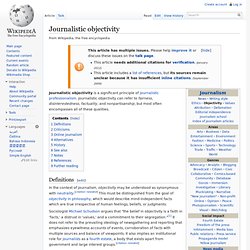
Journalistic objectivity can refer to fairness, disinterestedness, factuality, and nonpartisanship, but most often encompasses all of these qualities. Definitions[edit] Journalists and Social Media: How Far is Too Far? Should journalists avoid expressing opinion in their social media comments for fear of calling their objectivity into question? Or is the myth of real objectivity finally being torn by a global conversation in which everyone is expected to weigh in with his or her views? There’s a vigorous debate going on over at Gigaom about this subject . It was kicked off by a post by Mathew Ingram , who took issue with a social media policy recently installed at the Toronto Star that prohibits reporters from discussing stories in progress, commenting negatively upon their employer or colleagues or expressing any opinion that could raise questions about their objectivity. Ingram thinks the policy is nuts, and the story’s headline – “Newspapers and Social Media: Still Not Really Getting It” – leaves no question that Ingram’s objectivity isn’t in doubt.
We’re not so sure we agree with him. The issue isn’t whether people are biased or not: Everyone has opinions. Then there’s the issue of language. FOX News, MSNBC and Objectivity - Objectivity in Cable News. This is a confusing time for journalism students.

Professors stress the importance of objectivity in reporting, but some of the most prominent journalists in the country - the hosts of cable TV talk shows - are anything but objective. So what's going on? What's going on is that two of the three main cable news channels - FOX News and MSNBC - have discovered that opinion-based talk shows get high ratings. High ratings mean more money for these networks, so there's little incentive for either FOX or MSNBC to change their formats any time soon. FOX, on the one hand, is the conservative alternative for people who believe the so-called mainstream media have a liberal bent. MSNBC, meanwhile, has in recent years positioned itself as the liberal alternative to FOX. There's a reason O'Reilly, Olbermann and their ilk are popular - they're entertaining. Public Journalism and the Problem of Objectivity. Objectivity and Fairness - Objectivity and fairness in news stories.
You hear it all the time – reporters should be objective and fair.
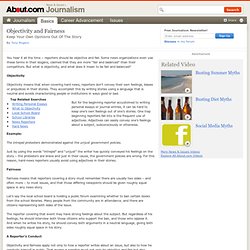
Some news organizations even use these terms in their slogans, claimed that they are more “fair and balanced” than their competitors. But what is objectivity, and what does it mean to be fair and balanced? Objectivity Objectivity means that when covering hard news, reporters don’t convey their own feelings, biases or prejudices in their stories. They accomplish this by writing stories using a language that is neutral and avoids characterizing people or institutions in ways good or bad. But for the beginning reporter accustomed to writing personal essays or journal entries, it can be hard to keep one’s own feelings out of one’s stories. Example: The intrepid protesters demonstrated against the unjust government policies. Just by using the words “intrepid” and “unjust” the writer has quickly conveyed his feelings on the story – the protesters are brave and just in their cause, the government policies are wrong.
Fair and Balanced? Journalism ethics and standards. Journalism ethics and standards comprise principles of ethics and of good practice as applicable to the specific challenges faced by journalists.
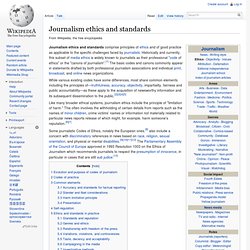
Historically and currently, this subset of media ethics is widely known to journalists as their professional "code of ethics" or the "canons of journalism".[1] The basic codes and canons commonly appear in statements drafted by both professional journalism associations and individual print, broadcast, and online news organizations. Evolution and purpose of codes of journalism[edit] The principles of Journalistic codes of ethics are designed as guides through numerous difficulties, such as conflicts of interest, to assist journalists in dealing with ethical dilemmas.
The codes and canons provide journalists a framework for self-monitoring and self-correction. Codes of practice[edit] One of the leading voices in the U.S. on the subject of Journalistic Standards and Ethics is the Society of Professional Journalists. Common elements[edit] Questioning Journalistic Objectivity. Journalism, as we've known it, has been mourned deeply over the last few years.
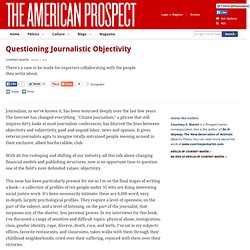
The Internet has changed everything. "Citizen journalism," a phrase that still inspires dirty looks at most journalism conferences, has blurred the lines between objectivity and subjectivity, paid and unpaid labor, news and opinion. It gives veteran journalists agita to imagine totally untrained people messing around in their exclusive, albeit hardscrabble, club. The Myth of Objectivity in Journalism. By This page has been accessed since 29 May 1996.
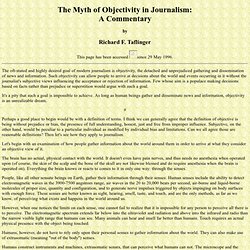
The oft-stated and highly desired goal of modern journalism is objectivity, the detached and unprejudiced gathering and dissemination of news and information. Such objectivity can allow people to arrive at decisions about the world and events occurring in it without the journalist's subjective views influencing the acceptance or rejection of information. Few whose aim is a populace making decisions based on facts rather than prejudice or superstition would argue with such a goal.
It's a pity that such a goal is impossible to achieve. Perhaps a good place to begin would be with a definition of terms. Let's begin with an examination of how people gather information about the world around them in order to arrive at what they consider an objective view of it. The brain has no actual, physical contact with the world. People, like all other sensate beings on Earth, gather their information through their senses.
The answer is no. Rethinking Journalism Ethics, Objectivity in the Age of Social Media. In response to the rapidly changing media environment, many schools and academic programs are offering novel approaches to journalism education.
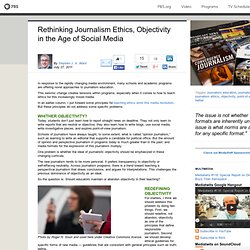
This seismic change creates tensions within programs, especially when it comes to how to teach ethics for this increasingly mixed media. In an earlier column, I put forward some principles for teaching ethics amid this media revolution. But these principles do not address some specific problems. Whither objectivity? Today, students don’t just learn how to report straight news on deadline.
Schools of journalism have always taught, to some extent, what is called “opinion journalism,” such as learning to write an editorial that supports a candidate for political office. One problem is whether the ideal of journalistic objectivity should be emphasized in these changing curricula. The new journalism tends to be more personal.